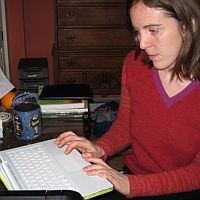Visit Hitting Home: The Struggle Continues

(Host) We turn now to our Hitting Home series on the recession, with a story about the troubling rate of underemployed Vermonters.
They’re people who are working in temporary, part-time jobs – often without benefits.
And as VPR’s Peter Biello reports… in this economy, even an advanced college degree may sometimes not be enough.
(Biello) Most days, Erin Haney follows the same routine. She wakes up around seven-thirty and wheels a cart of jars and filters to a shed in the middle of a field in Charlotte.
(Sounds of cow milking)
(Biello) Inside the shed, she milks a brown jersey cow. Haney says it’s a skill she says she’s picked up pretty quickly.
(Haney) "My brain just now knows, ‘Okay, this is what you do.’ For some people they have to stop, but for me it goes almost naturally for some strange reason. Maybe I was always meant to be a cow milker."
(Biello) Being a cow-milker was hardly what Haney had in mind when she graduated from the University of Vermont in 2008 with a master’s degree in ecological planning. She wanted to work for a watershed association, or help a community manage its natural resources, but so far she’s had no luck landing that kind of job.
(Door opens)
(Biello) To keep costs down, she moved in with a family in Charlotte that gives her a room in exchange for help with milking the cow. That’s about $400 a month that she doesn’t have to spend on rent.
(Haney) "If I had to pay that money, I just wouldn’t be able to do it. I absolutely would not be able to do it. Because I have not been gainfully employed for quite some time."
(Biello) Not since November 2008, to be exact. Since then, she’s worked odd jobs-at a market, as a substitute teacher, and as a cow milker.
(Typing)
(Biello) Once the milking is done, Haney logs onto her laptop. She says she spends at least six hours each day looking for a job. She has a variety of professional experience, including more than three years as a wetland ecologist for the State of Vermont. That’s on top of her work done in the private sector. Haney says her field is glutted and employers have become much more selective.
(Haney) "They want the best of the best of the best. And unfortunately there are tons of people in Vermont who are the best of the best of the best. So we’re all vying for those part-time, temporary, contract positions."
And that’s another problem: the jobs that are available are temporary, often funded by grants or foundations.
(Haney) "The most recent jobs have been part time, 20 to 24 hours a week in the conservation field, either for a conservation district or a grassroots land conservation organization, which has all been part time, no benefits. More like a contracted position. And those are what I’m finding here in Vermont."
(Heaps) "It’s a difficult situation to be in."
(Biello) Economist Dick Heaps says even during good times, underemployment in Vermont is a significant problem. During a recession, the problem only gets worse.
(Heaps) "We don’t have the jobs, so folks looking for the jobs may not find a full-time job, may find a part-time job. Others who work for themselves, they may not have 40 hours, they may find 25 hours."
(Biello) Back in her room, Erin Haney continues her search for those 25 hours. She’s sent résumés out for jobs both in and outside her field. She calls people, schedules informal chats over coffee, studies websites of companies whose missions she likes. Despite all the anxiety of not being able to find work in her field, Haney says she’s mostly optimistic.
(Haney) "There are days when I’m kind of a little downtrodden, but I have no doubt that something’s going to come up for me, for sure."
And so her routine ends: Before calling it a day, Haney checks her e-mail one last time, just to see if that "something" has finally come her way.
For VPR News, I’m Peter Biello.
Visit the series Hitting Home: The Struggle Continues